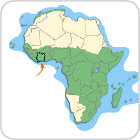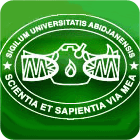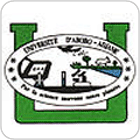Plant breeding programs in Cote d’Ivoire
 Situated in West Africa, the Republic of Cote d’Ivoire has a tropical climate along the coast of the North Atlantic Ocean and a semiarid one in the far north. Only 23% of the land is cultivated but farming is intensive and efficiently organized so that agriculture is the driving force of the country’s economy. The main cash crops are cocoa, coffee, oil palm, coconut, rubber tree, cotton, sugar cane, pineapple, mango, papaya and cashew, while the main food crops are rice maize, cassava, yam, banana, soybean, peanut, taro, millet, sorghum and vegetables.
Situated in West Africa, the Republic of Cote d’Ivoire has a tropical climate along the coast of the North Atlantic Ocean and a semiarid one in the far north. Only 23% of the land is cultivated but farming is intensive and efficiently organized so that agriculture is the driving force of the country’s economy. The main cash crops are cocoa, coffee, oil palm, coconut, rubber tree, cotton, sugar cane, pineapple, mango, papaya and cashew, while the main food crops are rice maize, cassava, yam, banana, soybean, peanut, taro, millet, sorghum and vegetables.
The national agricultural research system evolved significantly from the colonial period up to now. In the 1990s, the national agricultural research system was restructured by the Government. The Centre National de Recherche Agronomique (CNRA), created in April 1998, became from this date the main agricultural research institution in Côte d’Ivoire. In addition to this agricultural institution, there are two Universities where research activities are conducted. There are also foreign scientific institutions working in Côte d’Ivoire in the field of agronomy since long time ago: CSRS, CIRAD and IRD.
Plant breeding and associated biotechnologies are implemented in 40 programmes divided into two main crop-groups. The cash crop group comprises mainly cocoa, coffee and kola nut, while the food crop group is more interested in rice, maize, millet and sorghum. More than 1/3 of these programmes concerns the evaluation of fixed lines introduced from other breeding programmes. Current work is breeding for quality traits, favourable environments and biotic stress.
Since 1980, the main limiting aspect in plant breeding programmes is an inadequate availability of laboratory infrastructure to carry out experiments using advanced plant breeding techniques. Another important constraint is the limited access to national public and/or private genetic resources. With only 30% of breeders being Ph.D holders, the training of new scientists appears as a major concern.
Research and education institutes with activities in plant breeding
Public Institutes
|
|
Training and Research Unit of Science and Biology - Unité de Formation et de Recherche en Biosciences, Université de Cocody-Abidjan
|
|
|
Department of Sciences and Nature-Unité de Formation et de Recheche des Sciences de la Nature, Université de Abobo-Adjamé
|
Private Institutes
 |
Interprofessionnal Centre for Fruits and Vegetables - Centre Interprofessionel des Fruits et Légumes (CIFEL)CIFEL is a small organization (only one breeder and two biotechnologists) which works on banana and pineapple. It conducts breeding activities dealing with assessment of germplasm introduced from other programmes. |
Private-Public Partnerships
|
|
National Center for Agicultural Research - Centre National de Recherche Agronomique (CNRA)Created in 1998, CNRA combines the three former institutes of agricultural research: Agronomic Research Institute in Forest Zone (IDEFOR), Agronomic Research Institute in Savannah Zone (IDESSA) and the Ivorian Centre for Technological Research (CIRT). It is therefore the main agricultural research institution in Côte d’Ivoire. |
Information by Edmond Kouablan Koffi (2008) - Information based on the Ivory Coast's full report from the PBBC survey. Last revised 20-07-2009, GIPB


